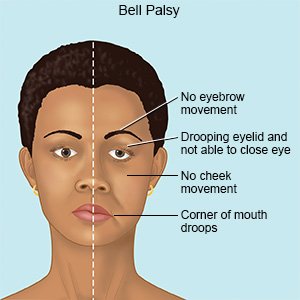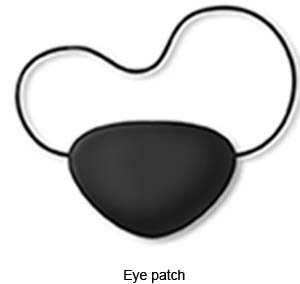Bell Palsy
Medically reviewed by Drugs.com. Last updated on Sep 23, 2025.
Bell palsy is a sudden weakness or paralysis of one side of your face. It occurs when the nerve that controls the muscles in your face becomes swollen or irritated. Bell palsy usually lasts about 2 to 3 weeks, but it can last for up to 6 months. Bell palsy can be permanent for some people.
 |
DISCHARGE INSTRUCTIONS:
Return to the emergency department if:
- You have vision changes or a loss of vision.
Call your doctor if:
- You have a fever.
- Your eye becomes red, irritated, or painful.
- Your symptoms have not gone away after 3 weeks.
- You have questions or concerns about your condition or care.
Related medications
Treatment options
The following list of medications are related to or used in the treatment of this condition.
Medicines:
You may need any of the following:
- Steroids may be given to decrease swelling and irritation of the nerve in your face. Your symptoms can go away faster if you get steroids 72 hours from when your paralysis started.
- Antiviral medicine may be given if your healthcare provider thinks a virus caused your Bell palsy.
- Acetaminophen decreases pain and fever. It is available without a doctor's order. Ask how much to take and how often to take it. Follow directions. Read the labels of all other medicines you are using to see if they also contain acetaminophen, or ask your doctor or pharmacist. Acetaminophen can cause liver damage if not taken correctly.
- NSAIDs , such as ibuprofen, help decrease swelling, pain, and fever. This medicine is available with or without a doctor's order. NSAIDs can cause stomach bleeding or kidney problems in certain people. If you take blood thinner medicine, always ask your healthcare provider if NSAIDs are safe for you. Always read the medicine label and follow directions.
- Take your medicine as directed. Contact your healthcare provider if you think your medicine is not helping or if you have side effects. Tell your provider if you are allergic to any medicine. Keep a list of the medicines, vitamins, and herbs you take. Include the amounts, and when and why you take them. Bring the list or the pill bottles to follow-up visits. Carry your medicine list with you in case of an emergency.
Manage Bell palsy:
- Eye care may be needed to prevent vision changes, eye damage, and infection. Use eye drops during the day and an ointment at night, as directed. You may need to wear an eye patch during the day. Wear sunglasses to protect your eye from direct sunlight. Stay away from places that have particles in the air that may harm your eye. You may also need to tape your eye shut while you sleep. Get your eye checked as directed if your symptoms last longer than 3 weeks.

- Eat soft foods that are easy to chew and swallow. These foods may be chopped, ground, mashed, pureed, and moist. Do not eat hard or chewy foods. These foods may fall out of your mouth where it droops. Ask your healthcare provider or dietitian about the foods you should eat.
- Go to speech therapy if you have trouble eating or drinking that continues longer than 3 weeks. A speech therapist can teach you new ways to eat and drink. The therapist can show you ways to prevent or manage problems with drooling or swallowing. You may also learn to plan several small meals instead of a few large meals each day.
- Use ear plugs or ear protectors around loud noises, such as a lawnmower or loud music. Foam earplugs that completely block your ear canal can help decrease your sensitive hearing. Do not listen to loud music through headphones or earphones.
- Go to physical therapy as directed. A physical therapist can teach you how to massage and exercise the muscles in your face. These exercises may help prevent long-term problems such as muscle spasms and permanent paralysis in your face.
- Talk to a mental health therapist if your symptoms are causing a low mood or anxiety. The therapist can help you cope while you recover.
Follow up with your doctor as directed:
Write down your questions so you remember to ask them during your visits.
© Copyright Merative 2025 Information is for End User's use only and may not be sold, redistributed or otherwise used for commercial purposes.
The above information is an educational aid only. It is not intended as medical advice for individual conditions or treatments. Talk to your doctor, nurse or pharmacist before following any medical regimen to see if it is safe and effective for you.
Learn more about Bell Palsy
Treatment options
Care guides
Further information
Always consult your healthcare provider to ensure the information displayed on this page applies to your personal circumstances.
